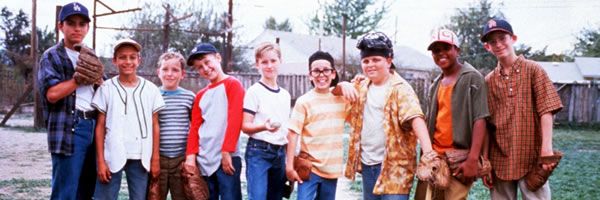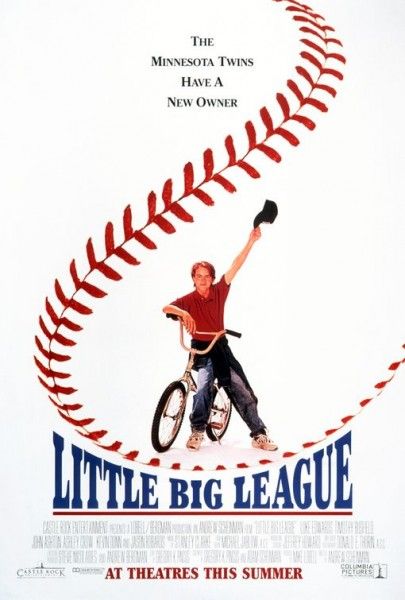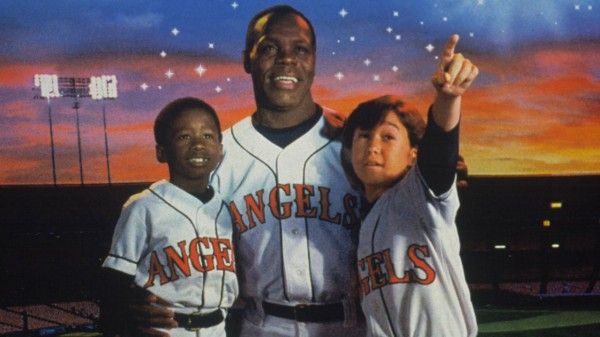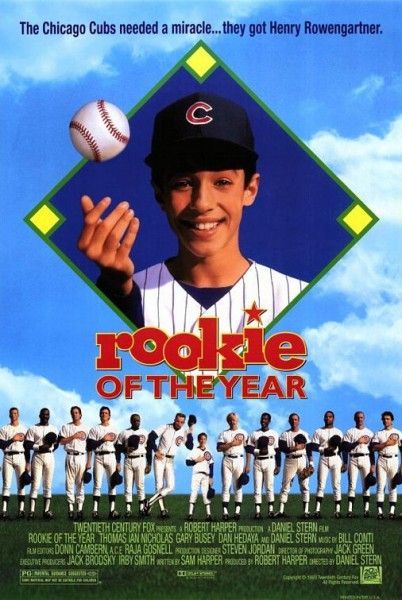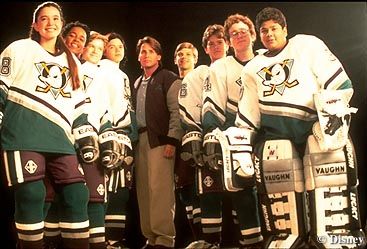[In anticipation of the 25th anniversary of The Sandlot, we've updated and reposted this editorial.]
The baseball season has begun, the NHL is headed for the race for the Stanley Cup, and the NBA is about to begin its endless playoff season. But at the multiplex, it's always the off-season for kids' sports films. When I was growing up, there was a boon of sports movies for kids. From 1991 to 1995, studios released a steady stream of movies featuring kids playing sports. Films released in these four years included (in chronological order): The Mighty Ducks (1992), The Sandlot (1993), Rookie of the Year (1993), D2: The Mighty Ducks (1994), Little Big League (1994), Angels in the Outfield (1994), Little Giants (1994), and The Big Green (1995). There were other sports movies that kids could go see (like A League of Their Own), but these movies in particular featured kids playing sports and/or being die-hard fans of the sport. These movies don't get made any more, but it's not like kids stopped playing sports. So why have these movies died off, and is there any hope of seeing them again?
Before I get to the reasons about why the kids-sports genre has vanished, I feel it's important to note that I don't think any of the aforementioned movies are classics (except for A League of Their Own). They all have flaws, and looking back at a couple of these movies with fresh eyes, it's easy to see that some of the child actors gave weak performances, the writing could be silly, the dialogue was sometimes cringe-worthy, and the stories sugarcoated of sports history and professional sports. For example, when a couple of the main boys in The Sandlot meet their African-American neighbor (James Earl Jones) and learned that he played professional baseball in the 1930s, there's no mention that he played in the Negro League because baseball was segregated until Jackie Robinson broke the color barrier in 1947. In Little Big League, the Minnesota Twins have fostered a locker room environment where no one swears. But these movies and the other kids sports' films of this era aren't meant to be a history lesson or an unflinching look at life off the field.
The 1991-1995 kids sports movies embrace a child's love sports as they understand sports, which is from the perspective of little league and televised games. Based on the movies from 1991 to 1995, kids absolutely adored sports, particularly baseball. In The Sandlot, the kids play the game with no innings, no score, and no set positions. They simply play for the love of the game and because their hero is Babe Ruth (keep in mind that the film takes place in 1962). In Rookie of the Year, a kid gets to live the dream of playing Major League Baseball while he's still a kid. Little Big League goes beyond taking the field since the dream of protagonist Billy Heywood (Luke Edwards) isn't to play on a baseball team; his dream is to manage a baseball team because the sport has engrossed him so thoroughly that he knows its history and how to call plays. And in Angels in the Outfield, literal angels make it their duty to help the California Angels win the pennant so that young Roger Bomman (Joseph Gordon-Levitt) can be reunited with his father.
All of these movies and other sports films for kids carry similar structures and values. The films involved team sports rather than individual sports like golf or singles-tennis because teams can take characters with vastly different personalities and bring them together to work towards a common goal. When an adult is thrown into the mix, like Danny Glover in Angels in the Outfield and Emilio Estevez in The Might Ducks, victory and a pure love of the game can turn the most cynical person into a believer. But victory isn't really the goal. The major lesson of most kids' sports movie is to just have fun. These movies say that as long as you get out there and work hard to make it to the championship, you'll have fun and make some friends along the way. That may not always jibe with reality, but it's a positive message, and one worth delivering in a children's movie.
The values of friendship, teamwork, and the fun of recreational sports haven't diminished since 1995. Additionally, kids still play sports, although the sports they play have changed. Baseball has drastically declined in popularity among today's youth, which is disappointing but understandable. It's a slow-paced game, and the romanticism for it, sadly, hasn't carried through the generations. But kids haven't abandoned all sports. They've simply changed the sports they play. According to The Wall Street Journal, "Studies suggest more people now play soccer in the U.S. than baseball, and lacrosse participation among kids has more than doubled in the last decade. The number of high school lacrosse programs has been growing by about 7% a year."
So why aren't there kids' movies about soccer or lacrosse? Baseball is America's Pastime, but it isn't America's Presentime. Football is the most popular televised sport today, and kids across the country play in Pee-Wee Leagues. I'm pretty sure you can't put a kid into a Rookie of the Year-type situation (although it would be darkly comic), but there has to be some way to tie the two together*. But I believe there are larger factors than simply finding a good plot, and this goes not just for a football-based kids movie, but for all sports.
To begin, none of the kids movies I mentioned ever set the box office on fire. If they were hits, they were modest hits, but their benefit was that they hardly cost anything to make. The kids weren't stars, and the adult actors weren't A-listers. In today's marketplace, studios don't want to hit singles and doubles**. They want to hit home runs, and they definitely want to hit them in the summer movie season. It's important to note that Little Big League, Rookie of the Year, and Angels in the Outfield all came out in the heart of the summer, but that was back when the movie business wasn't completely reliant on opening weekends. In the 90s, movies could still have time to grow legs and stick around the multiplex for a little while. Those days are gone, and now a kids' sports movie with no stars couldn't even begin to compete with superheroes and 3D animated movies.
Furthermore, movies are made for a global audience, and sports are regional. Baseball may be popular in first-world countries like the U.S., Canada (i.e. Toronto since they have a team), and Japan (it's also huge in the Dominican Republic, but the DR isn't really a major source of revenue), but the rest of the world doesn't have much interest in the game beyond the Olympics. The rest of the world cares about soccer, but the U.S. doesn't (unless it's during the World Cup, although Major League Soccer is growing at a steady clip). There are certainly soccer fans in the United States, and plenty of kids play soccer, but it's not really America's sport, which should be obvious since we call it "soccer" and the rest of the world calls it "football." And for American Football, no one else in the world cares because it's not really played anywhere other than the U.S. and Canada.
Finally, there's the problem of merchandising. Look at almost any kids' film today and there will be about a billion pieces of merchandise branded with the name of the property. That's not a new phenomenon, but now it seems like a mandate, and a kids' sports film doesn't meet that mandate. If the movie features a real sports team like the Twins or the Angels, then those teams already have the merchandise covered for their brand. If the studio is even able to create their own merchandise for the movie, those profits would probably have to be shared with the team [Note: this problem can be solved if you turn your movie into a sports team, like Disney did with The Mighty Ducks, but there's a reason that's only happened once in history] But without the team's brand, then you just have kids who play sports. You can create a toy from any movie, but an action figure of some kid playing soccer probably isn't going to sell when it's on the shelf next to Iron Man.
It's tough to dismiss the kids' sports films of the early 90s as a fad since sports aren't a fad, nor are little league teams. Those movies seized on something that was always there and continues to exist. The marketplace didn't drastically change in 1996, but the exponential growth of remakes and adaptation have pushed out original properties***.
As I said earlier, kids' sports films weren't perfect. Some of the child acting was weak, and the writing was sometimes even weaker, but the movies' heart was usually in the right place. Hollywood is always looking to hit home runs in the summer, but they're willing to go for modest hits in the spring and the fall. Kids may have far more options for their entertainment, but they're still playing sports and they're still watching sports. It's easy for me to sit at my desk and tell a studio how to spend their millions, but kids' sports film never cost a fortune, and kids like seeing themselves on screen doing something they can relate to. The interest is there, the audience is there, and the schedule is there. It's time for off-season to be over, and studios should seriously consider taking the field.
*The Gameplan doesn't count because it's not a movie about kids playing sports; it's a movie about Dwyane Johnson's character learning not to be a good father.
**I would ask you to forgive the puns, but "singles and doubles" is how Jeffrey Katzenberg referred to Disney's former strategy in a memo dated in 1991; he left the company in 1994 and went on to found DreamWorks Animation, a studio that always goes for home runs.
***Of the movies I listed, Angels in the Outfield is the only remake.

